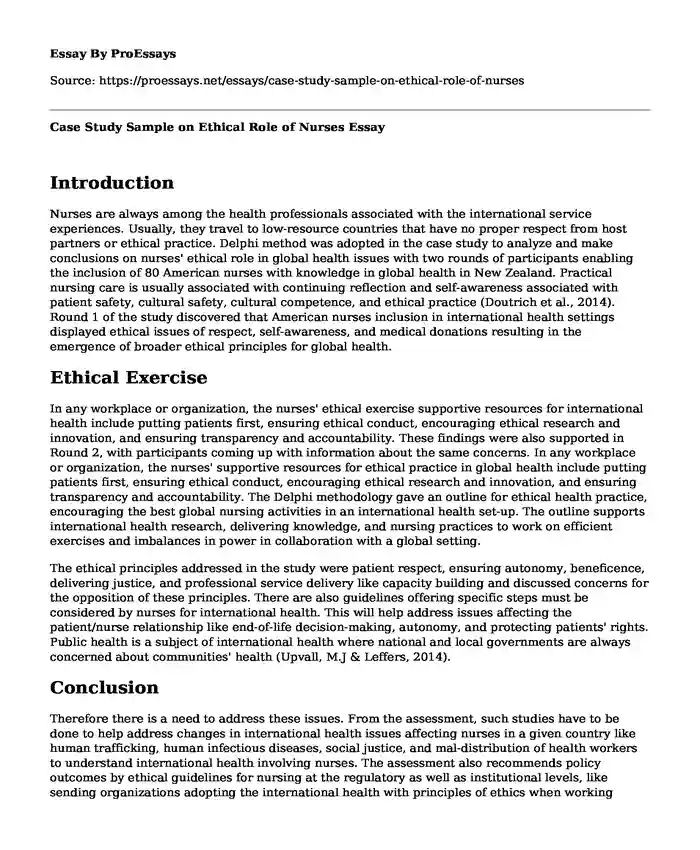Introduction
Nurses are always among the health professionals associated with the international service experiences. Usually, they travel to low-resource countries that have no proper respect from host partners or ethical practice. Delphi method was adopted in the case study to analyze and make conclusions on nurses' ethical role in global health issues with two rounds of participants enabling the inclusion of 80 American nurses with knowledge in global health in New Zealand. Practical nursing care is usually associated with continuing reflection and self-awareness associated with patient safety, cultural safety, cultural competence, and ethical practice (Doutrich et al., 2014). Round 1 of the study discovered that American nurses inclusion in international health settings displayed ethical issues of respect, self-awareness, and medical donations resulting in the emergence of broader ethical principles for global health.
Ethical Exercise
In any workplace or organization, the nurses' ethical exercise supportive resources for international health include putting patients first, ensuring ethical conduct, encouraging ethical research and innovation, and ensuring transparency and accountability. These findings were also supported in Round 2, with participants coming up with information about the same concerns. In any workplace or organization, the nurses' supportive resources for ethical practice in global health include putting patients first, ensuring ethical conduct, encouraging ethical research and innovation, and ensuring transparency and accountability. The Delphi methodology gave an outline for ethical health practice, encouraging the best global nursing activities in an international health set-up. The outline supports international health research, delivering knowledge, and nursing practices to work on efficient exercises and imbalances in power in collaboration with a global setting.
The ethical principles addressed in the study were patient respect, ensuring autonomy, beneficence, delivering justice, and professional service delivery like capacity building and discussed concerns for the opposition of these principles. There are also guidelines offering specific steps must be considered by nurses for international health. This will help address issues affecting the patient/nurse relationship like end-of-life decision-making, autonomy, and protecting patients' rights. Public health is a subject of international health where national and local governments are always concerned about communities' health (Upvall, M.J & Leffers, 2014).
Conclusion
Therefore there is a need to address these issues. From the assessment, such studies have to be done to help address changes in international health issues affecting nurses in a given country like human trafficking, human infectious diseases, social justice, and mal-distribution of health workers to understand international health involving nurses. The assessment also recommends policy outcomes by ethical guidelines for nursing at the regulatory as well as institutional levels, like sending organizations adopting the international health with principles of ethics when working internationally. At educational level, regulatory bodies can encourage laws that bind international health nurses responsible by issuing licenses for them to teach and work across all countries (McCall, D., & Iltis, 2014). Furthermore, global health nurses have to comply with national policies concerning licensure, partnerships, and international donations. Researchers in the nursing sector have to investigate policy changes in ethical medical donations and global partnerships.
References
Doutrich, D., Dekker, L., Spuck, J., & Hoeksel, R. (2014). Identity, ethics, and cultural safety:Strategies for change.Whitireia Nursing and Health Journal,21(2014), 15-21.
McCall, D., & Iltis, A. (2014). Health care voluntourism: Addressing ethical concerns ofundergraduate student participation in global health volunteer work.HEC Forum,2014(26), 285-297.
Upvall, M. J., & Leffers, J. (2014). Global health nursing: Building and sustaining partnerships.
Cite this page
Case Study Sample on Ethical Role of Nurses. (2024, Jan 01). Retrieved from https://proessays.net/essays/case-study-sample-on-ethical-role-of-nurses
If you are the original author of this essay and no longer wish to have it published on the ProEssays website, please click below to request its removal:
- Critical Infrastructure Security Emergency Management: An Assessment of Richmond-Virginia International Airport
- The Well Being of the Elderly in Asia Versus Europe Essay
- Article Analysis Essay on Wasting Time on the Internet and Is Google Making Us Stupid
- Paper Example on Creating a Weekly Eating Plan: Easy and Nutritious
- Plato's View on the Immortality of the Soul - Essay Sample
- Paper Example on Herbal Plants: Natural Sources of Safer Therapeutic Treatments
- Statistics: Essential Tool for Informed Decision-Making Essay Example







